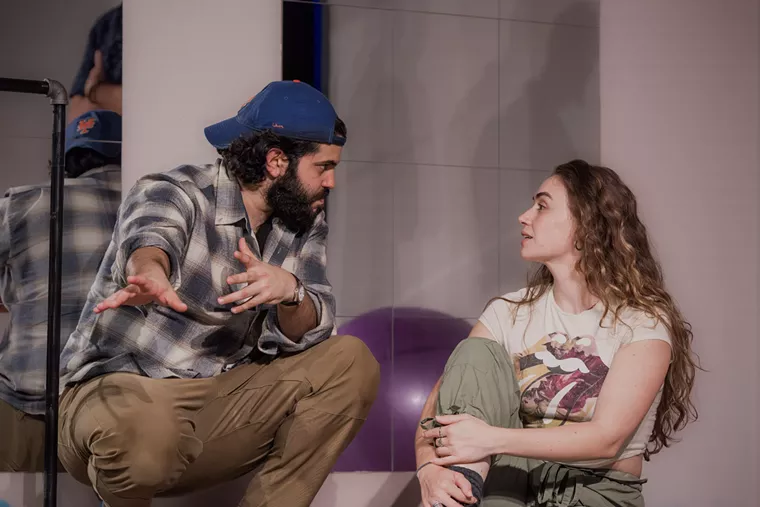Review: Circle Mirror Transformation at Mighty Acorn Productions
At one point in Annie Baker’s 2009 play Circle Mirror Transformation, now being staged by Mighty Acorn Productions, the teacher of an adult acting class encourages her students to be “open and willing to go with it.” And that happens to be perfect advice for potential audiences as well.
But first, the set-up.
In small-town New England, it’s the first week of a six-week adult acting class at the local community center. The small class is led by a 51-year-old woman named Marty, the teacher quoted above, and the class includes Marty’s husband, James; Schultz, a recently divorced carpenter who still wears his wedding ring; Theresa, a former actress and transplant from New York attempting to cope with a recent breakup; and Lauren, a soon-to-be high school senior who wants the part of Maria in an upcoming school production of West Side Story.
Marty leads the group through a variety of standard acting class games, which in turn ask the would-be performers to play tag, have a conversation using nonsense words, and embody the qualities of, say, a bed or a baseball glove. As the weeks progress, so does our understanding of the characters as well as their understanding of themselves and each other.
There’s an idea that’s prevalent when it comes to good dialogue: It’s how people would talk if they just had more time to think about what to say. Typically, that means the uhs and the ums, the meanderings and the stumbles, get edited out. Baker’s script does the opposite. It’s in its naturalism, and in the fits and starts of thoughts unfinished and sometimes repeated, that Baker finds depth. Through the sentence fragments, hesitations, and interruptions, Baker offers us glimpses of her characters, portraits gaining color and shape as the play progresses.
Christian Tannous and Anna Flynn in Annie Baker’s Circle Mirror Transformation.
Photo by Jeff McMorrough
As such, Circle Mirror Transformation is character-driven. Regarding the plot, there’s not much to write home about. To sustain the show, you need an especially adept director and a talented cast to hold an audience’s attention. Mighty Acorn has both.
Director David Kenner puts on a clinic in handling the subtleties of Baker’s script – in an unforgiving environment, too. The play takes place on a corner-set stage in a room much like one that would host a real five-person acting class. It’s small, intimate, the cast close enough to touch as they use the main entry door as just that – in and out for breaks and arrivals.
Mark Lewis’s set is simple and effective – wood paneling on the floor, an exercise ball here, a bulletin board there, and mirrors along one side. On the other wall, a dry-erase board to count down the weeks and a critical directive: “Listen. Stay open. Commit.” Lewis actually dons multiple hats for the production, credited as scene, lighting, and sound designer.
Then, of course, there’s the stellar ensemble this production boasts.
Tracy Ahern and Foster Davis in Annie Baker’s Circle Mirror Transformation.
Photo by Jeff McMorrough
There’s a new age-y vibe to Tracy Ahern as the well-meaning and warm Marty. (Of course, she would have a dreamcatcher and just look at those flowy teal pants). At times, Ahern is positioned outside the action, guiding the class with a benevolent hand, but it’s when Ahern is an active participant, and Marty’s vulnerability comes through, that she is at her best – particularly, in scenes with Foster Davis.
When the play begins, the lights go up on the entire cast lying on the floor, playing a counting game with their eyes closed. Except Davis’s James, that is, whose eyes are noticeably open and darting around. Davis imbues James with a kindness that matches Ahern’s Marty, but it’s not long until we start seeing past the veneer, learning about James’s estrangement from his daughter and finding marital resentments. In one especially memorable scene, Ahern and Davis roleplay as Lauren’s parents, deftly blurring the lines between real Marty’s and James’ conflict underneath it all.
Christian Tannous plays Schultz like a ticking time bomb. Emotionally, Schultz is a man standing on ever shaky ground. He’s brusque, the kind of guy who says things like “What’s your deal?” when a “New in town?” would probably suffice. He seems easily excitable, with a lot of frustration and anger underneath, and his unpredictability makes it hard to take your eyes off him.
Anna Flynn, Callina Anderson, and Foster Davis in Annie Baker’s Circle Mirror Transformation.
Photo by Jeff McMorrough
As Theresa, Callina Anderson shows off an ease with and enthusiasm for the acting class that is only compromised when she’s reminded of her recent past. She is as visibly haunted as she is joyous at times, like when she’s hooping (as in that circular thing you swivel around your waist). Anderson is also a master at finding the undercurrent in her interactions, notably in scenes with Tannous and Davis.
Anna Flynn rounds out the cast, capturing that certain world weariness that only teenagers seem to have. As Lauren, she begins the play detached, finding Marty’s lesson plans suspect and openly questioning how any of her games are supposed to help with acting. Flynn’s arc is ultimately the most interesting, as by the end of the six-week class her demeanor has shifted, allowing Flynn to deliver a tender and powerful monologue that is not only not to be missed, but framed beautifully under Lewis’s pinpoint lighting design.
For most of the show, Lewis approximates standard rec room lighting, which makes the moments when it’s played with, as during the in and out of the room entries and exits, the nicely chaotic transitions, and one standout moment when Tannous acts out an explosion, more effective. One less-than-appreciated element on the sound side is the too-loud toilet flush that practically becomes its own character in the second act.
If you need one specific reason to see Circle Mirror Transformation, you can find it in one exercise the class does. In each of the first five weeks, we see the characters take turns introducing themselves as one of their classmates. And each introduction quickly goes from surface-level biographical details and “fun facts” (“I’m from New Hampshire” or “I really love the southwest”) to things like “I’m in a lot of pain” and “I think the problem is not my father so much as my fear of being my father.” Seeing the looks on each face as they listen to someone tell their story…well, that kind of acting is worth the price of admission alone.

Reign Bowers is an outdoor enthusiast, adventure seeker, and storyteller passionate about exploring nature’s wonders. As the creator of SuperheroineLinks.com, Reign shares inspiring stories, practical tips, and expert insights to empower others—especially women—to embrace the great outdoors with confidence.







Post Comment